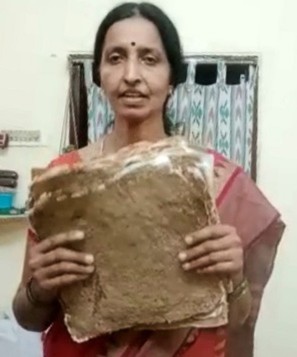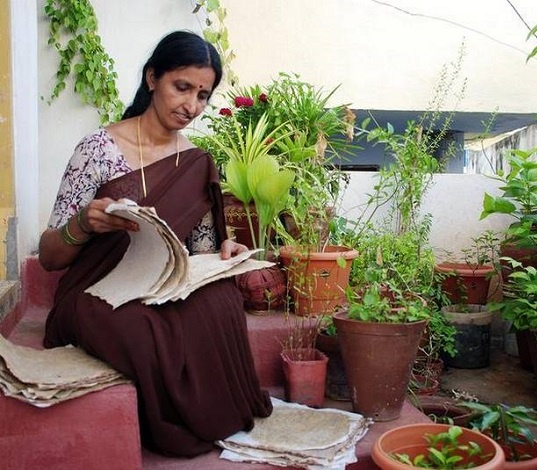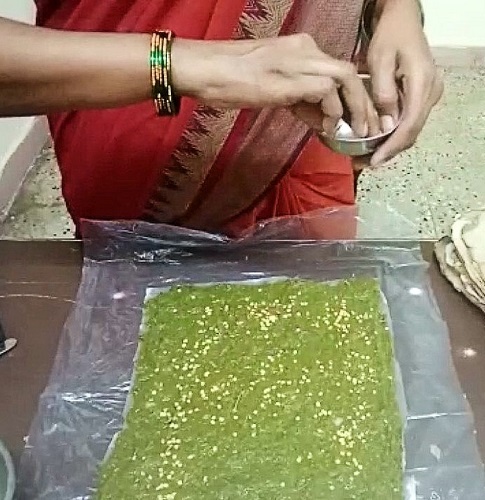What's the Magic out of kitchen wet waste that we are talking about. You can do it too.

#Collect fruit and vegetable waste for over two days and store it in the refrigerator.
#Collect okra stem tips to add stickiness to the pulp. You can even add a few neem leaves to the mix as this will act as a natural pesticide to keep insects from attacking the seeds.
# Add water and blend the scraps until they form a smooth pulp.
# Cut open a plastic bag and make it act as a base to mould the paper. (You can even draw lines to mould the perfect shape.)
# Spread the pulp over the plastic sheet and sprinkle up to 12 seeds.
#Wait for a few mins for the pulp to settle and slowly remove it from the plastic sheet. Allow it to dry on the terrace.
# Once the upper surface is hard, slowly peel it off and overturn. Again, leave it under the sun for two days for the other side to dry.
#Cut it into desired sizes and plant whenever necessary.
Wondering what this process is all about and how come an achiever's story page has converted into some process-oriented knowledge hub? Well, this is the process followed by Arunjyothi Lokhande, a resident of Nalgonda, Telangana to deal with the wet waste in her house. She processes wet waste generated in her house to make seed paper napkins. This innovative approach of her was lauded by the Telangana State Innovation Cell.
The Foul Smell And The Solution:
Arunjyothi has been collecting kitchen scraps and preparing compost out of them so she can use them as manure for her garden plants since 2014. But every time she collected the compost and let it settle in her kitchen, the foul smell that emanated from it irritated her husband and son (quite obvious!) who kept complaining. Arunjyothi then had to think of a solution. What she did next impressed everyone and is something extremely useful for the environment (plants) too.
"Pulpy" Sheets With Seeds:
In order to deal with the foul smell from the wet waste, Arunjyothidecided to grind the waste into a pulp and make paper from it. Woah! Interesting! Not a regular paper though, on which you can write and erase but the one that can be planted as manure. She got an idea following which she blended the vegetable and fruit scraps in a blender turning them into a fine paste. Once the paste turns smooth, she spread it on to a plastic sheet in a rectangular shape. She then placed a thin paper napkin to measure the size of the sheet. This thin paper napkin is such that it usually dissolves when brought in contact with water. She peeled it off after a few minutes and let it dry under the sun for two days. This was her first attempt which failed because the wet waste became extremely dry under the sun and crumbled into powder when she tried to peel it off the plastic sheet. Then, Arunjyothi decided to add something that would bind the pulp. To act as a sticky agent, she mixed the okra tips and blended the pulp. The idea worked and the paper came out in the way it has to.

She said that the sheets of paper were the size of a handkerchief. “I would cut three or four bits from one sheet and add it every day to my plants,” says Arunjyothi. After this process of manure-rich sheets became successful, Arunjyothi then added seeds of plants like tomato, brinjal, and spinach from a local nursery on the wet sheet of pulp before placing it on the terrace to dry. "The first few sheets were presented as gifts to friends and family. I have planted a few sheets in my own garden as well, and they grew into tulsi and tomato plants,” says Arunjyothi. In order to curb the smell, the steps taken by Arunjyothiled to a new invention that is proving fruitful. These napkins that can be torn into bits and potted to grow into plants are the best forms of dry compost. Her creative solution to re-use the amount of waste generated impressed the authorities of the Telangana State Innovation Cell.

Childhood Creativity:
Arunjyothi's mother was the main reason behind her turning into a creative brain. Her interest in arts and crafts as a child was developed from her mother. "My mother would use an earthen chulha to prepare food. When I was seven years old, she taught me how to make one,” she recalls. Arunjyothi said that as she grew older, she continued to learn arts and crafts like embroidery and paper mache moulding from people around her. Arunjyothi pursued BA Diploma in Costume Designing and looks after a clothing store along with her husband. She also conducts various workshops on art in schools and organises art galleries too. Her popular workshops include sessions on how to make Ganesha and handmade paper from waste paper. The money she thus collects with paid sessions, she invests in delivering free sessions to underprivileged children. “I use the money collected from paid workshops to sponsor the free ones, which are usually conducted for children living in slums,” says Arunjyothi.
Arunjyothi made an innovation that helped not only her but also all those who are trying to prepare compost at home. She came up with a unique solution that would send the manure into the ground and seeds to the soil.
If you Like to contribute to this Page, Please Drop us a Mail.
hello@bookofachievers.com
















